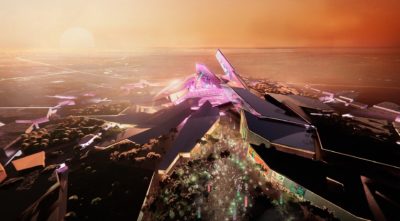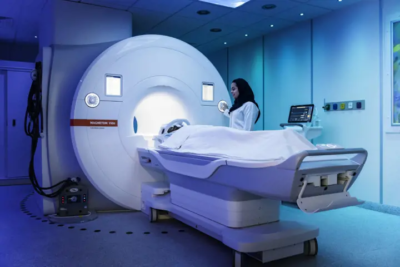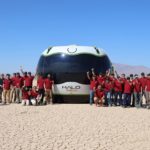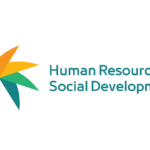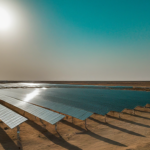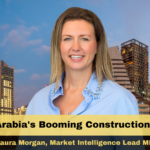
“At this week’s Saudi Water Forum in Riyadh, central privatization body the Saudi Water Partnership Company (SWPC) said that the amount of water produced at privately owned desalination plants was set to grow from 2.54 million m3/d at the end of last year to 7.48 million m3/d by 2027 as key plants come online and more contracts are pushed out to the market.”

“The new personal law will help women who are divorced to become legal guardians of their children, demand alimony rights and child care support. Women are no longer legally required to ask for permission to travel, marry or make personal choices- who they want to marry can no longer be a family decision, she can go to court and do what she wants.”
–Somayya Youssef, a Saudi marketing major in Riyadh, discussing the personal status law that will come into effect in 90 days in Saudi Arabia. [The National]

“The fact that the U.S. Pavilion here at the World Defense Show is the largest – and so is our government delegation – sums up how much importance the U.S. industry and the U.S. government attach to this strategic partnership… all of this engagement translates into $54 billion annually in U.S.-Saudi trade and investment” of which the defense sector accounts for a significant portion, creating tens of thousands of jobs in both countries.”
Speaking at an American Chamber of Commerce in Saudi Arabia event, U.S. Chargé d’Affaires Martina Strong highlighted that U.S. defense companies have been at the heart of U.S.-Saudi economic and security relations since 1945. [American Chamber of Commerce in Saudi Arabia]

“Just to clarify. There are no longer ‘expert level talks.’ Nor ‘formal meetings.’ It is time, in the next few days, for political decisions to end the #ViennaTalks. The rest is noise.”
-The European Union’s top envoy Enrique Mora, who coordinates the talks. [Reuters]

“If I told you that I see the finish line, this would mean that I’m a horrible leader. The finish line is something distant. You just keep running, and keep running faster. And keep creating more finish lines and just keep running. Our aim is to be faster than the rest and achieve more than the rest.”
-HRH Crown Prince Mohammed Bin Salman, from the full transcript of his interview with The Atlantic. [Saudi Gazette]

“The feedback that we got from the Saudis is that they see the OPEC+ agreement with Russia as a long-term commitment and they are not ready yet to endanger that cooperation… while making it clear that they stand with the West when it comes to security cooperation.”

“We are going back to the roots, back to pure Islam, to be sure that the soul of Saudi Arabia, based on Islam, our culture, whether tribal, or urban , is serving the nation , serving the people, serving the region, serving the whole world, and is leading us to economic growth. And that’s what happened in the past five years. So today, I’m not saying we might do this. Maybe if we were having an interview in 2016, you would say I’m making assumptions, and that this is just the analysis of the Crown Prince of Saudi Arabia. But we did it. You see it now with your eyes in Saudi Arabia. Just come and check it out, and watch the videos of Saudi Arabia six or seven years ago. We did a lot, and there are a few things still to do. And we are going to work to make them happen.”
-Crown Prince Mohammed Bin Salman [Saudi Gazette]

“We have a long, historical relationship with America. Our aim is to keep it and strengthen it….Where is the potential in the world today? It’s in Saudi Arabia. And if you want to miss it, I believe other people in the East are going to be super happy.”
-Crown Prince Mohammed bin Salman, in a new interview with The Atlantic magazine. [The Atlantic]

“Set to be built in King Abdullah Economic City, a mega-project on the Red Sea coast, Lucid Group’s first overseas manufacturing plant will at first re-assemble Lucid Air vehicle ‘kits’ that are pre-manufactured at the company’s AMP-1 Manufacturing Facility in Casa Grande, Arizona. Over time, the plant fully owned by Lucid Group will build complete vehicles, with Lucid targeting a peak capacity of 150,000 vehicles per year.”

“Lucid aspires to be a catalyst for change wherever we go, so it makes perfect sense that we are bringing electric vehicles to one of the world’s biggest oil producing nations. Establishing a global manufacturing footprint is a practical, natural step and enables us to grow our brand, scale our business, and address worldwide and untapped market demand on an entirely new level, while also taking action to address climate change through inspiring sustainable transportation.”
-Peter Rawlinson, CEO of Lucid Motors, in a press release. Lucid has signed an agreement with Saudi Arabia to build its first international factory in the Kingdom. [Lucid Motors]
